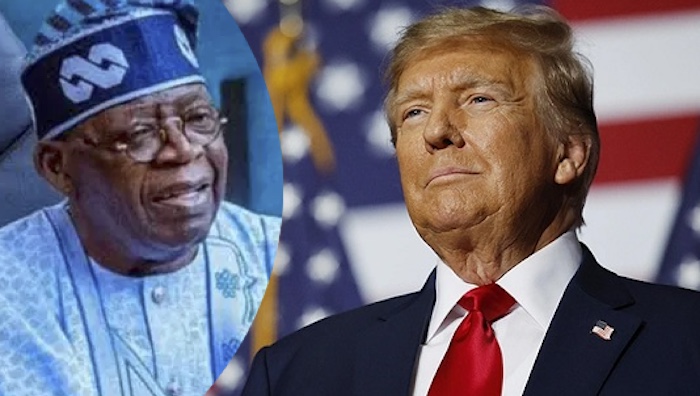Why Nigeria faces economic uncertainty as Trump reshapes global trade

BY MOTOLANI OSENI
The return of Donald Trump to the White House has set in motion significant shifts in global economic policies, trade relations, and geopolitical dynamics, with profound implications for Nigeria.
His administration’s stance on energy production, trade nationalism, exchange rate policies, remittances, and foreign aid will shape Nigeria’s economic trajectory in the coming years.
According to Director and CEO of the Centre for the Promotion of Private Enterprise (CPPE), Dr Muda Yusuf, these developments will have far-reaching effects on government revenue, trade relations, macroeconomic stability, inflation, capital flows, and the competitiveness of Nigerian businesses.
Dr Yusuf highlighted that one of the most immediate effects of Trump’s policies will be felt in the global oil market. “The United States has maintained its position as the world’s largest oil producer, accounting for approximately 22 per cent of global output. Trump’s renewed commitment to expanding domestic oil production, coupled with diplomatic efforts to push OPEC into increasing output, could drive crude oil prices lower,” he explained.
He added that if Trump successfully de-escalates geopolitical tensions, particularly in the Russia-Ukraine and Israel-Hamas conflicts, the global oil supply could increase significantly, putting further downward pressure on oil prices.
For Nigeria, a major crude oil exporter, declining oil prices would translate to reduced government revenue and foreign exchange earnings, exacerbating the already precarious fiscal situation.
Dr Yusuf warned that the implications would be far-reaching, affecting the ability to finance critical infrastructure projects, service debt obligations, and stabilise the exchange rate.
“The broader consequence would be increased pressure on public finances, a widening fiscal deficit, and heightened economic uncertainty,” he noted.
Dr Yusuf also pointed out that the Trump administration’s commitment to economic nationalism, protectionism, and deglobalisation presents another critical challenge.
“The aggressive imposition of trade tariffs and the fragmentation of global supply chains could create disruptions that extend to Nigeria,” he said.
He noted that the African Growth and Opportunity Act (AGOA), which has provided preferential access to the U.S. market for eligible African countries, could face termination under Trump’s trade policies. “While Nigeria has not fully capitalised on AGOA, its discontinuation would further narrow trade opportunities,” he remarked.
Additionally, he observed that Trump’s trade policies could weaken global economic growth, leading to a slowdown in demand for oil and other commodities, thereby affecting Nigeria’s exports. However, he pointed out that retaliatory measures from major economies against the U.S. may create supply gaps in certain markets, presenting opportunities for Nigerian businesses.
“To take advantage of these openings, Nigeria must address its infrastructure challenges, enhance production capacity, and improve the ease of doing business,” Dr Yusuf advised.
A stronger U.S. dollar is another likely outcome of Trump’s economic policies. Dr Yusuf explained that the administration’s restrictive trade measures, alongside anticipated interest rate hikes by the U.S. Federal Reserve, could drive up the value of the dollar.
READ ALSO: Binance: We’ll refrain from further comment – House spokesman
“Given the inverse relationship between the dollar and other currencies, the naira would come under additional pressure. A stronger dollar typically leads to higher import costs for Nigerian businesses, fuelling inflation and increasing production costs,” he stated.
Moreover, he cautioned that capital flow reversals could become a significant concern. “Higher interest rates in the U.S. would attract global investors, leading to capital outflows from emerging markets, including Nigeria. This would further strain Nigeria’s foreign exchange reserves and intensify exchange rate volatility, making it more expensive for businesses to import essential inputs,” he warned.
Dr Yusuf also addressed concerns about remittances from Nigerians in the diaspora. “Nigerians in the U.S. contribute significantly to the economy through remittances, which have been a vital source of foreign exchange and household income support. However, Trump’s stringent immigration policies, including crackdowns on undocumented migrants, could negatively impact remittance flows,” he said.
He pointed out that with an estimated 500,000 Nigerians living in the U.S., many of whom send money home regularly, any policy that restricts their economic activities could have ripple effects on Nigeria’s foreign exchange earnings and household consumption patterns.
Another pressing concern is the potential suspension or termination of USAID funding in Nigeria. Dr Yusuf noted that in 2023, the U.S. provided $1.02 billion in aid, primarily supporting health, education, water and sanitation, and governance reforms.
“Programmes focusing on HIV/AIDS treatment, maternal and child healthcare, and disease prevention could suffer funding gaps if Trump moves to cut foreign aid,” he stated. While this development presents a significant challenge, he stressed that it underscores the urgency for Nigeria to build domestic capacity in critical sectors. “Overdependence on foreign aid is unsustainable, and the government must prioritise alternative funding mechanisms to ensure continued service delivery, particularly in the healthcare sector,” he said.
Dr Yusuf emphasised that the unfolding global economic landscape reinforces the importance of self-reliance. “Nigeria must intensify efforts to reduce import dependence, particularly in sectors such as energy, agriculture, pharmaceuticals, and security. Excessive reliance on external economies for critical goods and services poses a risk to economic stability and national security,” he warned.
He advised that the government’s trade and industrial policies should be strategically designed to promote local production and export growth. “The current economic reforms aimed at deepening backward integration, enhancing competitiveness, and reducing vulnerabilities to external shocks should be pursued with greater urgency,” he urged. He also called for special emphasis on food security, energy security, and industrial development to mitigate potential disruptions in global supply chains.
Furthermore, Dr Yusuf stressed the need to address infrastructure deficits, improve logistics networks, and foster a more investment-friendly environment to position Nigerian businesses for competitiveness in a rapidly evolving global economy. “With the world moving towards economic nationalism and deglobalisation, Nigeria must recalibrate its policies to ensure economic resilience and sustainable growth in the face of shifting international dynamics,” he concluded.








